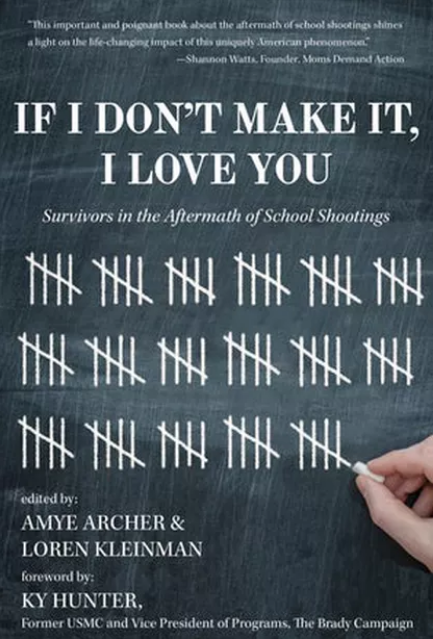|
The Breadcrumbs widget will appear here on the published site.
Survivor Narratives
For over 50 years, school shootings have been a prevalent concern in American culture. Just recently, the Columbine High School Massacre reached its 20th anniversary, a tragic day of remembrance and guilt for those left behind. A recent story from CNN is a narrative-based testament to how helpless many survivors still feel.
"We're sorry we couldn't stop it," said Coni Sanders, the daughter of Coach Dave Sanders. Coach Sanders was one of the thirteen victims of the Columbine shooting. Though her statement was directed to Parkland survivor Mei-Ling Ho-Shing, Sanders' words are a universal representation of the "baton-passing" of gun violence trauma. Similar stories have been shared in documentaries focusing on the chronic problem as well, such as The Tower and Newtown. Each person's story is unique, adding to the weight of grief that looms over modern culture. Unfortunately, the conversation does not seem to be going anywhere soon. But putting survivor's voices on the forefront of action may be the key our society needs to shut down senseless loss of life. If I Don't Make It, I Love You: Survivors in the Aftermath of School Shootings is an essential collection of survivor narratives. I reached out to editors Amye Archer and Loren Kleinman, wanting to know what this anthology would bring to further the conversation for lasting change. Their answers inspire further action and a call to empathy.
What inspired you to curate this collection?
This project started with a simple question: What ever happened to those kids who survived Columbine? Loren, my co-editor, and I were roughly their age when that shooting occurred, and in our own ways, we carried them with us into young adulthood. We both watched, helpless, as more and more mass shootings happened in our schools. Then, Sandy Hook. My twin daughters were the same age as those children killed that day, and while that does not in any way mean the shootings which occurred prior were less disturbing or painful, it just felt different as a parent now. Sandy Hook broke something inside of me, and I think this book helped piece that back together. Loren and I also loved working together on our previous anthology, and we realize how rare it is to find someone with whom you can connect on a creative level, so we were sure that we could get through this together. The collection covers over 50 years of school-related shootings. What was the most striking thing to you about each of the survivor's stories? One thing we discovered pretty early on was that each community has a theme connected to the shooting. Sometimes those themes overlap with other communities, sometimes they don't. For example, Columbine was the first shooting we all witnessed play out on live television, so media coverage and the emergence of the internet played a large role in the aftermath. With Parkland, we see a reoccurring theme of communication-texts sent and never answered, miscommunication, etc. Then, there's advocacy coming from Virginia Tech and Sandy Hook, and Parkland certainly. There are also differences in the way communities healed, and what role the schools and administrators played in that journey. Some responses were not always well thought out. Many survivors were angry. Yet, some communities found comfort in one another. As I mentioned, the media also plays a big role. We see the media as a part of the healing process in later schools like Parkland and Santa Fe, while schools from the early nineties, pre-Columbine,,huddled together and shied away from coverage-preferring to heal privately. How long did it take to curate this collection? We worked on this project for over a year. We began thinking about it in early 2018, and then Parkland happened, and we knew we had to do it. What do you hope this collection will do to further the narrative of gun violence in America? First, it is our hope that by reading these stories, Americans in particular, will understand the trauma left in these communities once the cameras go away. Secondly, we really wanted to elevate the voices of these survivors to the national level. In recent years, especially before Parkland, there was something missing from conversations about school shootings and mass shootings, and that was the voice of the survivor. Who better to participate in this ongoing dialogue than someone who lived through a mass shooting and understands exactly what that trauma looks like 5, 10, 20 years out? We recognize that there have been survivors out there advocating and participating in these conversations already, but we hope this book will bring more survivors together, creating a chorus that can no longer be ignored. What else do you want our audience to know about the process of curating this collection? While gathering these stories and talking with these contributors was often difficult and weighed on us in many ways, it was an enormous privilege. We heard stories and made connections that we will never forget. Working with trauma is difficult, it sticks to you. However, we are aware that while we sat with and held this trauma for only one year, there are whole communities, generations even, of people holding a heavier trauma day after day, year after year. We hope that by telling their stories and giving voice to their experience, that weight is a little lighter. The anthology is scheduled to be released September 3rd, 2019. You can preorder the collection from Amazon now. A portion of the proceeds will go to benefit survivors of gun violence:
0 Comments
CommentsYour comment will be posted after it is approved.
Leave a Reply. |
AuthorWrite something about yourself. No need to be fancy, just an overview. Archives
July 2024
Categories
All
|



 RSS Feed
RSS Feed






